53°24′32″N 1°26′38″W / 53.409°N 1.444°W
| Sheffield, Brightside | |
|---|---|
| Former Borough constituency for the House of Commons | |
 Boundary of Sheffield, Brightside in South Yorkshire for the 2005 general election | |
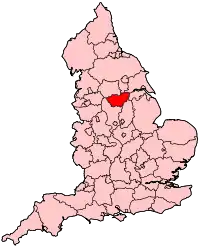 Location of South Yorkshire within England | |
| County | South Yorkshire |
| 1885–2010 | |
| Created from | Sheffield |
| Replaced by | Sheffield Brightside and Hillsborough |
Sheffield, Brightside was a parliamentary constituency in the City of Sheffield. Created for the 1885 general election, and replaced at the 2010 general election by the new constituency of Sheffield Brightside and Hillsborough, it elected one Member of Parliament (MP) to the House of Commons of the Parliament of the United Kingdom, using the first-past-the-post voting system.
In its first fifty years, Brightside returned a variety of Liberal, Conservative and Labour MPs. However, from 1945 onwards, it became one of the Labour Party's safest seats in the United Kingdom. It was represented by David Blunkett from 1987 until its abolition; he continued to hold the successor seat until he retired in 2015, becoming the seat's longest-serving MP.
Boundaries
1885–1918: The Municipal Borough of Sheffield ward of Brightside.
1918–1950: The County Borough of Sheffield wards of Brightside and Burngreave.
1950–1955: The County Borough of Sheffield wards of Brightside, Firth Park, and Tinsley.[1]
1955–1983: The County Borough of Sheffield wards of Brightside, Firth Park, Nether Shire, and Southey Green.[2]
1983–2010: The City of Sheffield wards of Brightside, Firth Park, Nether Shire, Owlerton, and Southey Green.
Sheffield Brightside covered the north of the city. It bordered the constituencies of Rotherham, Sheffield Central, Sheffield Heeley and Sheffield Hillsborough.
Following their review of parliamentary representation in South Yorkshire, the Boundary Commission for England recommended that Sheffield Brightside should gain all of Burngreave and Hillsborough wards, with Walkley moving to Sheffield Central, and that the constituency be renamed Sheffield Brightside and Hillsborough.
History
Sheffield Brightside was created in 1885 when the former Sheffield constituency was split into five constituencies.
Members of Parliament
Elections

Elections in the 1880s
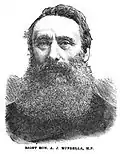
| Party | Candidate | Votes | % | ±% | |
|---|---|---|---|---|---|
| Liberal | A. J. Mundella | 4,616 | 57.7 | ||
| Conservative | Edmund Fitzalan-Howard | 3,382 | 42.3 | ||
| Majority | 1,234 | 15.4 | |||
| Turnout | 7,998 | 86.0 | |||
| Registered electors | 9,298 | ||||
| Liberal win (new seat) | |||||
Mundella was appointed President of the Board of Trade, requiring a by-election.
| Party | Candidate | Votes | % | ±% | |
|---|---|---|---|---|---|
| Liberal | A. J. Mundella | Unopposed | |||
| Liberal hold | |||||
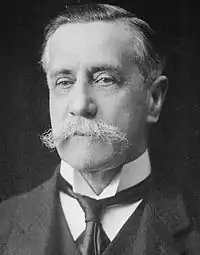
| Party | Candidate | Votes | % | ±% | |
|---|---|---|---|---|---|
| Liberal | A. J. Mundella | 4,280 | 55.7 | −2.0 | |
| Conservative | Edmund Fitzalan-Howard | 3,398 | 44.3 | +2.0 | |
| Majority | 882 | 11.4 | −4.0 | ||
| Turnout | 7,678 | 82.6 | −3.4 | ||
| Registered electors | 9,298 | ||||
| Liberal hold | Swing | −2.0 | |||
Elections in the 1890s
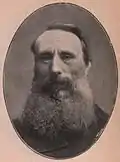
| Party | Candidate | Votes | % | ±% | |
|---|---|---|---|---|---|
| Liberal | A. J. Mundella | 4,938 | 57.4 | +1.7 | |
| Conservative | Bargrave Deane[4] | 3,661 | 42.6 | −1.7 | |
| Majority | 1,277 | 14.8 | +3.4 | ||
| Turnout | 8,599 | 82.7 | +0.1 | ||
| Registered electors | 10,400 | ||||
| Liberal hold | Swing | +1.7 | |||
Mundella was appointed President of the Board of Trade, requiring a by-election.
| Party | Candidate | Votes | % | ±% | |
|---|---|---|---|---|---|
| Liberal | A. J. Mundella | Unopposed | |||
| Liberal hold | |||||
| Party | Candidate | Votes | % | ±% | |
|---|---|---|---|---|---|
| Liberal | A. J. Mundella | Unopposed | |||
| Liberal hold | |||||
Mundella's death caused a by-election.
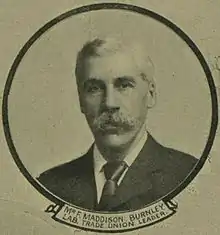
| Party | Candidate | Votes | % | ±% | |
|---|---|---|---|---|---|
| Lib-Lab | Frederick Maddison | 4,289 | 51.1 | N/A | |
| Conservative | James Hope | 4,106 | 48.9 | New | |
| Majority | 183 | 2.2 | N/A | ||
| Turnout | 8,395 | 74.3 | N/A | ||
| Registered electors | 11,301 | ||||
| Lib-Lab hold | Swing | N/A | |||
Elections in the 1900s
| Party | Candidate | Votes | % | ±% | |
|---|---|---|---|---|---|
| Conservative | James Hope | 4,992 | 55.3 | N/A | |
| Lib-Lab | Frederick Maddison | 4,028 | 44.7 | N/A | |
| Majority | 964 | 10.6 | N/A | ||
| Turnout | 9,020 | 77.1 | N/A | ||
| Registered electors | 11,700 | ||||
| Conservative gain from Liberal | Swing | N/A | |||
| Party | Candidate | Votes | % | ±% | |
|---|---|---|---|---|---|
| Liberal | Tudor Walters | 5,409 | 55.1 | +10.4 | |
| Conservative | James Hope | 4,408 | 44.9 | −10.4 | |
| Majority | 1,001 | 10.2 | N/A | ||
| Turnout | 9,817 | 81.1 | +4.0 | ||
| Registered electors | 12,108 | ||||
| Liberal gain from Conservative | Swing | +10.4 | |||
Elections in the 1910s

| Party | Candidate | Votes | % | ±% | |
|---|---|---|---|---|---|
| Liberal | Tudor Walters | 6,156 | 56.6 | +1.5 | |
| Conservative | Douglas Vickers | 4,200 | 38.7 | −6.2 | |
| Social Democratic Federation | Charles Lapworth | 510 | 4.7 | New | |
| Majority | 1,956 | 17.9 | +7.7 | ||
| Turnout | 10,866 | 86.5 | +5.4 | ||
| Registered electors | 12,564 | ||||
| Liberal hold | Swing | +3.9 | |||
| Party | Candidate | Votes | % | ±% | |
|---|---|---|---|---|---|
| Liberal | Tudor Walters | 5,766 | 59.6 | +3.0 | |
| Conservative | Douglas Vickers | 3,902 | 40.4 | +1.7 | |
| Majority | 1,864 | 19.2 | +1.3 | ||
| Turnout | 9,672 | 77.0 | −9.5 | ||
| Registered electors | 12,564 | ||||
| Liberal hold | Swing | +0.7 | |||
| Party | Candidate | Votes | % | ±% | |
|---|---|---|---|---|---|
| C | Liberal | Tudor Walters | 12,164 | 64.2 | +4.6 |
| Labour | Richard Edward Jones | 6,781 | 35.8 | New | |
| Majority | 5,383 | 28.4 | +9.2 | ||
| Turnout | 18,945 | 52.0 | −25.0 | ||
| Liberal hold | Swing | N/A | |||
| C indicates candidate endorsed by the coalition government. | |||||
Elections in the 1920s
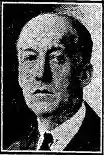
| Party | Candidate | Votes | % | ±% | |
|---|---|---|---|---|---|
| Labour | Arthur Ponsonby | 16,692 | 60.4 | +24.6 | |
| National Liberal | Tudor Walters | 10,949 | 39.6 | -24.6 | |
| Majority | 5,743 | 20.8 | N/A | ||
| Turnout | 27,641 | 75.0 | +23.0 | ||
| Labour gain from National Liberal | Swing | ||||
| Party | Candidate | Votes | % | ±% | |
|---|---|---|---|---|---|
| Labour | Arthur Ponsonby | 14,741 | 53.0 | -7.4 | |
| Unionist | Matthew Sheppard | 9,408 | 33.8 | New | |
| Liberal | Thomas Illingworth Clough | 3,684 | 13.2 | -26.4 | |
| Majority | 5,333 | 19.2 | -1.6 | ||
| Turnout | 27,833 | 73.0 | -2.0 | ||
| Labour hold | Swing | N/A | |||
| Party | Candidate | Votes | % | ±% | |
|---|---|---|---|---|---|
| Labour | Arthur Ponsonby | 17,053 | 55.4 | +2.4 | |
| Unionist | Matthew Sheppard | 13,708 | 44.6 | +10.8 | |
| Majority | 3,345 | 10.8 | -8.4 | ||
| Turnout | 30,761 | 78.9 | +5.9 | ||
| Labour hold | Swing | ||||
| Party | Candidate | Votes | % | ±% | |
|---|---|---|---|---|---|
| Labour | Arthur Ponsonby | 20,277 | 55.2 | -0.2 | |
| Unionist | R.I. Money | 9,828 | 26.8 | -17.8 | |
| Liberal | W.A.Lambert | 6,612 | 18.0 | New | |
| Majority | 10,449 | 28.4 | +17.6 | ||
| Turnout | 36,717 | 77.3 | -1.6 | ||
| Labour hold | Swing | ||||
Elections in the 1930s
| Party | Candidate | Votes | % | ±% | |
|---|---|---|---|---|---|
| Labour | Fred Marshall | 11,543 | 46.3 | -8.9 | |
| Conservative | Hamer Russell | 8,612 | 34.6 | +7.8 | |
| Liberal | W.A. Lambert | 3,650 | 14.7 | -3.3 | |
| Communist | J. T. Murphy | 1,084 | 4.4 | New | |
| Majority | 2,931 | 11.7 | -16.7 | ||
| Turnout | 24,889 | ||||
| Labour hold | Swing | ||||
| Party | Candidate | Votes | % | ±% | |
|---|---|---|---|---|---|
| Conservative | Hamer Russell | 20,270 | 53.1 | +26.3 | |
| Labour | Fred Marshall | 15,528 | 40.6 | -14.6 | |
| Communist | J. T. Murphy | 1,571 | 4.1 | N/A | |
| New Party | E. C. Snelgrove | 847 | 2.2 | New | |
| Majority | 4,742 | 12.5 | N/A | ||
| Turnout | 38,216 | 79.6 | +2.3 | ||
| Conservative gain from Labour | Swing | ||||
| Party | Candidate | Votes | % | ±% | |
|---|---|---|---|---|---|
| Labour | Fred Marshall | 18,985 | 58.5 | +17.9 | |
| Conservative | Hamer Russell | 13,467 | 41.5 | −11.6 | |
| Majority | 5,518 | 17.0 | N/A | ||
| Turnout | 32,452 | 68.7 | -10.9 | ||
| Labour gain from Conservative | Swing | ||||
Elections in the 1940s
| Party | Candidate | Votes | % | ±% | |
|---|---|---|---|---|---|
| Labour | Fred Marshall | 19,373 | 61.2 | +2.7 | |
| Conservative | Brian Taylor | 8,177 | 25.8 | −15.7 | |
| Communist | Howard Hill | 4,115 | 13.0 | New | |
| Majority | 11,196 | 35.4 | +18.4 | ||
| Turnout | 31,665 | 75.5 | +6.8 | ||
| Labour hold | Swing | ||||
Elections in the 1950s
| Party | Candidate | Votes | % | ±% | |
|---|---|---|---|---|---|
| Labour | Richard Winterbottom | 32,542 | 69.6 | +8.4 | |
| National Liberal | H. S. V. Smith | 13,136 | 28.1 | +2.3 | |
| Communist | Howard Hill | 1,081 | 2.3 | -11.7 | |
| Majority | 19,406 | 41.5 | +6.1 | ||
| Turnout | 46,759 | 84.6 | +9.1 | ||
| Labour hold | Swing | ||||
| Party | Candidate | Votes | % | ±% | |
|---|---|---|---|---|---|
| Labour | Richard Winterbottom | 31,519 | 69.9 | +0.3 | |
| National Liberal | Alfred L Wood | 12,433 | 27.6 | −0.5 | |
| Communist | Howard Hill | 1,116 | 2.5 | +0.2 | |
| Majority | 19,086 | 42.3 | +0.8 | ||
| Turnout | 45,068 | 81.4 | −3.2 | ||
| Labour hold | Swing | ||||
| Party | Candidate | Votes | % | ±% | |
|---|---|---|---|---|---|
| Labour | Richard Winterbottom | 27,643 | 66.9 | −3.0 | |
| National Liberal | Edward W Flynn | 12,239 | 29.6 | +2.0 | |
| Communist | Howard Hill | 1,461 | 3.5 | +1.0 | |
| Majority | 15,404 | 37.3 | −5.0 | ||
| Turnout | 41,343 | 71.1 | −10.3 | ||
| Labour hold | Swing | ||||
| Party | Candidate | Votes | % | ±% | |
|---|---|---|---|---|---|
| Labour | Richard Winterbottom | 28,302 | 67.5 | +0.6 | |
| Conservative | Hugo Clifford Holmes | 12,269 | 29.3 | −0.3 | |
| Communist | Howard Hill | 1,373 | 3.3 | −0.2 | |
| Majority | 16,033 | 38.2 | +0.9 | ||
| Turnout | 41,944 | 73.5 | +2.4 | ||
| Labour hold | Swing | ||||
Elections in the 1960s
| Party | Candidate | Votes | % | ±% | |
|---|---|---|---|---|---|
| Labour | Richard Winterbottom | 27,317 | 70.7 | +3.2 | |
| Conservative | Alexander Leitch | 9,963 | 25.8 | −3.5 | |
| Communist | Howard Hill | 1,356 | 3.5 | +0.2 | |
| Majority | 17,354 | 44.9 | +6.7 | ||
| Turnout | 29,669 | 70.3 | −3.2 | ||
| Labour hold | Swing | ||||
| Party | Candidate | Votes | % | ±% | |
|---|---|---|---|---|---|
| Labour | Richard Winterbottom | 26,653 | 75.9 | +5.2 | |
| Conservative | Raymond Whitley Hadfield | 7,476 | 21.3 | −4.5 | |
| Communist | Howard Hill | 989 | 2.8 | −0.7 | |
| Majority | 19,177 | 54.6 | +9.7 | ||
| Turnout | 35,118 | 66.2 | −4.1 | ||
| Labour hold | Swing | ||||
| Party | Candidate | Votes | % | ±% | |
|---|---|---|---|---|---|
| Labour | Edward Griffiths | 14,179 | 55.2 | -20.7 | |
| Conservative | Colin Renfrew | 8,931 | 34.8 | +13.5 | |
| Communist | Robert Wilkinson | 1,069 | 4.1 | +1.3 | |
| Independent | Ronald Guest | 918 | 3.6 | New | |
| Independent | H. L. Lambert | 586 | 2.3 | New | |
| Majority | 5,248 | 20.4 | -34.2 | ||
| Turnout | 25,683 | ||||
| Labour hold | Swing | ||||
Elections in the 1970s
| Party | Candidate | Votes | % | ±% | |
|---|---|---|---|---|---|
| Labour | Edward Griffiths | 23,941 | 72.2 | −3.7 | |
| Conservative | Tony Newton | 8,572 | 25.8 | +4.5 | |
| Communist | Gordon Ashberry | 665 | 2.0 | −0.8 | |
| Majority | 15,369 | 46.4 | −8.2 | ||
| Turnout | 33,178 | 62.0 | −4.2 | ||
| Labour hold | Swing | ||||
| Party | Candidate | Votes | % | ±% | |
|---|---|---|---|---|---|
| Labour | Edward Griffiths | 27,363 | 68.4 | −3.8 | |
| Conservative | John Smith | 6,796 | 17.0 | −8.8 | |
| Liberal | Thomas Blades | 5,347 | 13.4 | New | |
| Communist | Violet Gill | 513 | 1.3 | −0.7 | |
| Majority | 20,567 | 51.4 | +5.1 | ||
| Turnout | 40,019 | 74.5 | +12.5 | ||
| Labour hold | Swing | ||||
| Party | Candidate | Votes | % | ±% | |
|---|---|---|---|---|---|
| Labour | Joan Maynard | 18,108 | 49.7 | −18.7 | |
| Independent Labour | Edward Griffiths | 10,182 | 27.9 | New | |
| Conservative | Roy Walker | 4,905 | 13.5 | - 3.5 | |
| Liberal | Thomas Blades | 3,271 | 9.0 | −4.4 | |
| Majority | 7,926 | 21.8 | −29.6 | ||
| Turnout | 36,466 | 67.4 | −7.1 | ||
| Labour hold | Swing | ||||
| Party | Candidate | Votes | % | ±% | |
|---|---|---|---|---|---|
| Labour | Joan Maynard | 25,672 | 68.5 | +18.8 | |
| Conservative | Betty Knightly | 7,979 | 21.2 | +7.7 | |
| Liberal | Malcolm Johnson | 3,482 | 9.3 | +0.3 | |
| National Front | K. T. Brack | 354 | 0.9 | New | |
| Majority | 17,693 | 47.3 | +25.5 | ||
| Turnout | 37,487 | 68.8 | +1.4 | ||
| Labour hold | Swing | ||||
Elections in the 1980s
| Party | Candidate | Votes | % | ±% | |
|---|---|---|---|---|---|
| Labour | Joan Maynard | 25,531 | 58.0 | −10.5 | |
| Liberal | Francis Butler | 10,322 | 23.4 | +14.1 | |
| Conservative | David Grayson | 7,888 | 17.9 | −3.3 | |
| National Front | P. A. Spinks | 286 | 0.7 | −0.2 | |
| Majority | 15,209 | 34.5 | −14.8 | ||
| Turnout | 44,037 | 65.5 | −3.3 | ||
| Labour hold | Swing | ||||
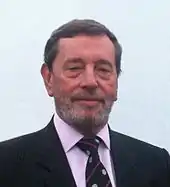
| Party | Candidate | Votes | % | ±% | |
|---|---|---|---|---|---|
| Labour | David Blunkett | 31,208 | 69.9 | +11.9 | |
| Conservative | Mary Glyn | 7,017 | 15.7 | −2.2 | |
| Liberal | John Leeman | 6,434 | 14.4 | −9.0 | |
| Majority | 24,191 | 54.2 | +19.7 | ||
| Turnout | 44,659 | 68.7 | +3.2 | ||
| Labour hold | Swing | ||||
Elections in the 1990s
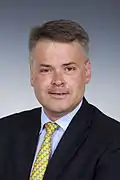
| Party | Candidate | Votes | % | ±% | |
|---|---|---|---|---|---|
| Labour | David Blunkett | 29,771 | 70.4 | +0.5 | |
| Conservative | Tim Loughton | 7,090 | 16.8 | +1.1 | |
| Liberal Democrats | Richard Franklin | 5,273 | 12.5 | −1.9 | |
| International Communist | David Hyland | 150 | 0.4 | New | |
| Majority | 22,681 | 53.7 | −0.5 | ||
| Turnout | 42,224 | 66.3 | −2.4 | ||
| Labour hold | Swing | ||||
| Party | Candidate | Votes | % | ±% | |
|---|---|---|---|---|---|
| Labour | David Blunkett | 24,901 | 73.5 | +3.1 | |
| Liberal Democrats | Francis Butler | 4,947 | 14.6 | +2.1 | |
| Conservative | Christopher Buckwell | 2,850 | 8.4 | −8.4 | |
| Referendum | Brian Farnsworth | 624 | 1.8 | New | |
| Socialist Labour | Paul Davidson | 482 | 1.4 | New | |
| Natural Law | Richard Scott | 61 | 0.2 | New | |
| Majority | 19,954 | 58.9 | +5.2 | ||
| Turnout | 33,865 | 57.5 | -8.8 | ||
| Labour hold | Swing | ||||
Elections in the 2000s
| Party | Candidate | Votes | % | ±% | |
|---|---|---|---|---|---|
| Labour | David Blunkett | 19,650 | 76.9 | +3.4 | |
| Conservative | Matthew Wilson | 2,601 | 10.2 | +1.8 | |
| Liberal Democrats | Alison Firth | 2,238 | 8.8 | −5.8 | |
| Socialist Alliance | Brian Wilson | 361 | 1.4 | New | |
| Socialist Labour | Robert Morris | 354 | 1.4 | New | |
| UKIP | Anthony Suter | 348 | 1.4 | New | |
| Majority | 17,049 | 66.7 | +7.8 | ||
| Turnout | 25,552 | 47.2 | −10.3 | ||
| Labour hold | Swing | ||||
| Party | Candidate | Votes | % | ±% | |
|---|---|---|---|---|---|
| Labour | David Blunkett | 16,876 | 68.5 | −8.4 | |
| Liberal Democrats | Jonathan Harston | 3,232 | 13.1 | +4.3 | |
| Conservative | Tim Clark | 2,205 | 9.0 | −1.2 | |
| BNP | Christopher Hartigan | 1,537 | 6.2 | New | |
| UKIP | Judith Clarke | 779 | 3.2 | +1.8 | |
| Majority | 13,644 | 55.4 | -11.3 | ||
| Turnout | 24,629 | 48.5 | +1.3 | ||
| Labour hold | Swing | −6.4 | |||
See also
References
- ↑ "Representation of the People Act 1948: Schedule 1", legislation.gov.uk, The National Archives, 1948 c. 65 (sch. 1), retrieved 23 July 2023
- ↑ "The Parliamentary Constituencies (Sheffield) Order 1955. SI 1955/183". Statutory Instruments 1955. Part II. London: Her Majesty's Stationery Office. 1956. pp. 2164–2165.
- 1 2 3 4 5 6 7 8 9 Craig, FWS, ed. (1974). British Parliamentary Election Results: 1885-1918. London: Macmillan Press. ISBN 9781349022984.
- ↑ "The General Election". Yorkshire Gazette. 11 June 1892. p. 7. Retrieved 22 November 2017.
- ↑ "Election Data 1983". Electoral Calculus. Archived from the original on 15 October 2011. Retrieved 18 October 2015.
- ↑ "Election Data 1987". Electoral Calculus. Archived from the original on 15 October 2011. Retrieved 18 October 2015.
- ↑ "Election Data 1992". Electoral Calculus. Archived from the original on 15 October 2011. Retrieved 18 October 2015.
- ↑ "Election Data 1997". Electoral Calculus. Archived from the original on 15 October 2011. Retrieved 18 October 2015.
- ↑ "Election Data 2001". Electoral Calculus. Archived from the original on 15 October 2011. Retrieved 18 October 2015.
- ↑ "Election Data 2005". Electoral Calculus. Archived from the original on 15 October 2011. Retrieved 18 October 2015.
Sources
- Sheffield Brightside BBC News, Election 2005
- Sheffield Brightside BBC News, Vote 2001
- Election history - Sheffield Brightside The Guardian
- Leigh Rayment's Historical List of MPs – Constituencies beginning with "B" (part 5)
- Political Science Resources Archived 2 July 2009 at the Wayback Machine Election results from 1951 to present
- F. W. S. Craig, British Parliamentary Election Results 1918 - 1949
- F. W. S. Craig, British Parliamentary Election Results 1950 - 1970
- Sheffield General Election Results 1945 - 2001, Sheffield City Council